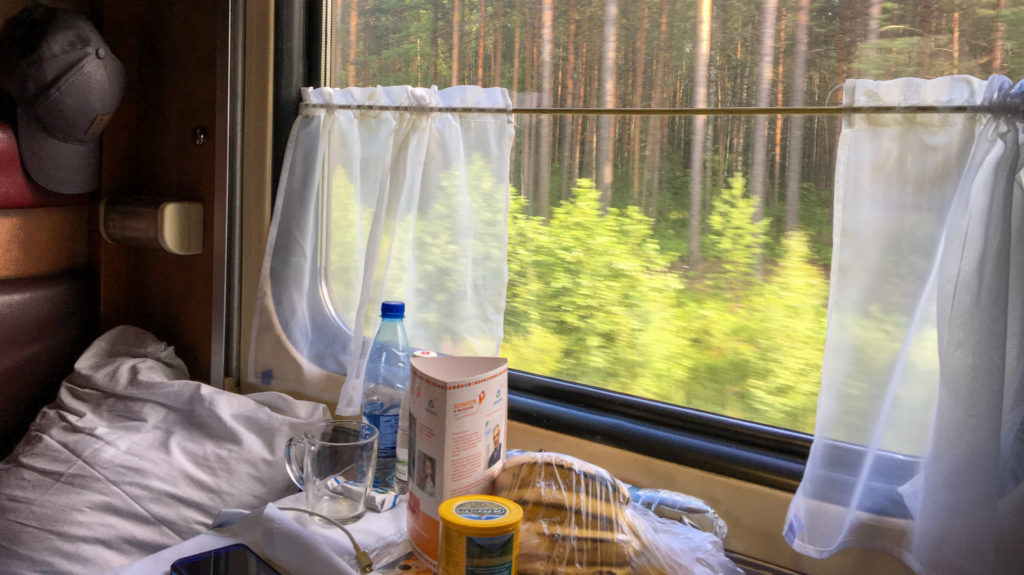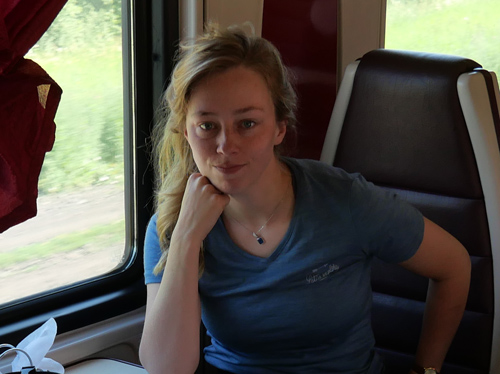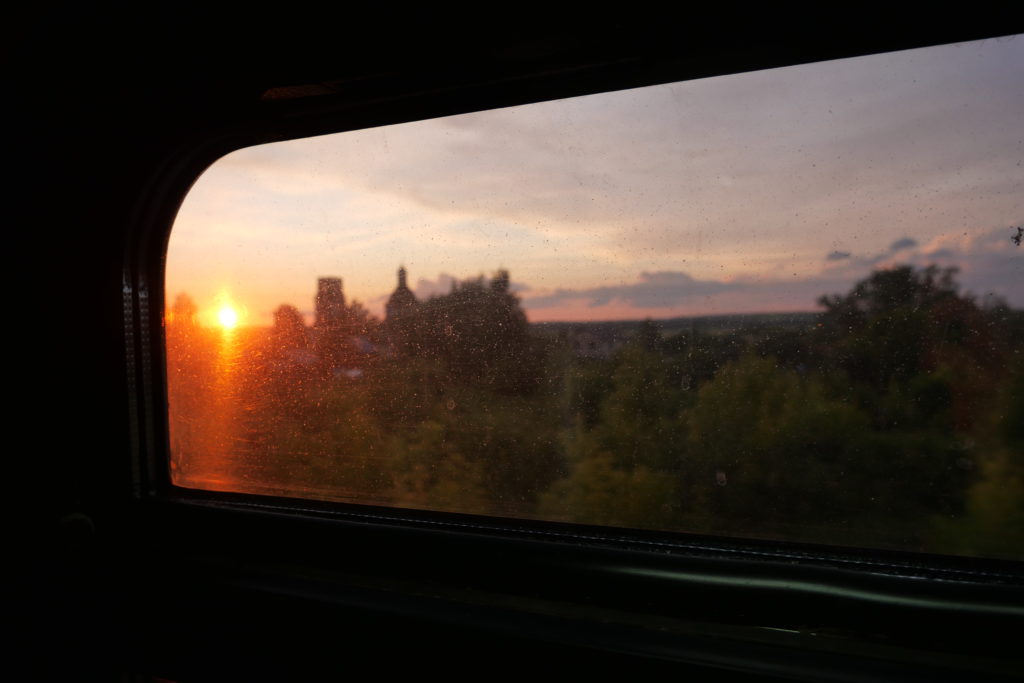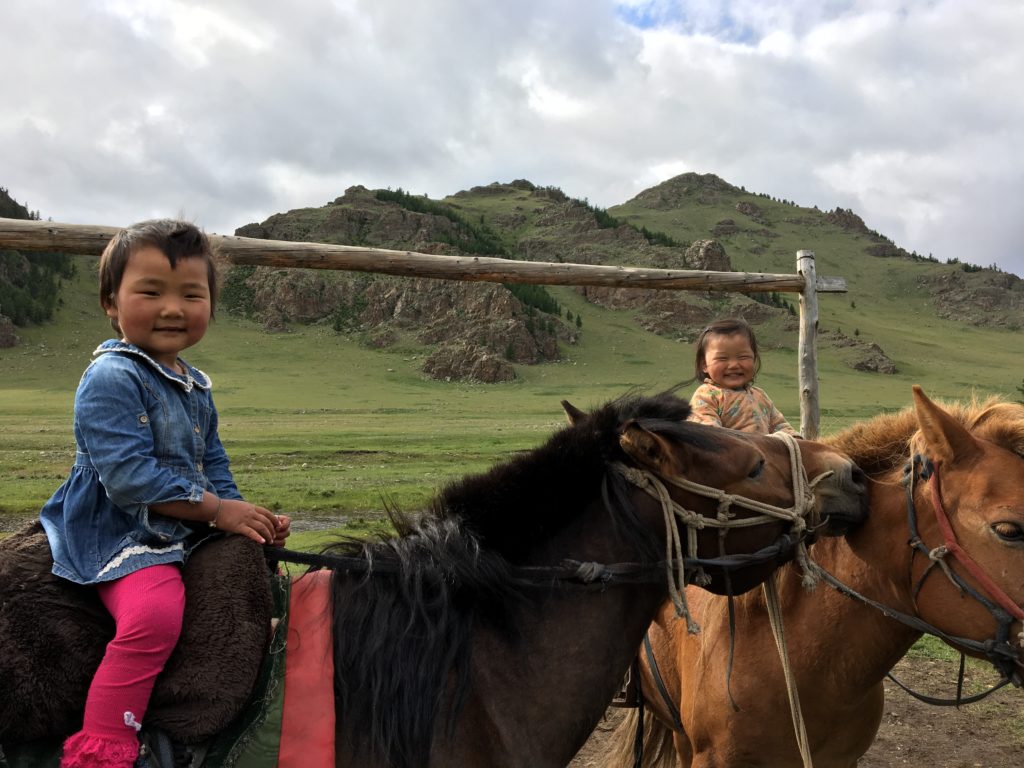TiU alumna traveled with Trans-Siberia Express: “In China we were constantly watched”
From “scary” border controls to the hard nomadic life in Mongolia. Alumna Denise van Dalen experienced quite something during her train journey from Moscow to Beijing. She describes the unique and sometimes bizarre experiences in her book Het Spoor van de Tsaar (The Trail of the Czar) that will be published on November 6.

If you travel by plane to Asia, like magic, you will find yourself in a completely different world the same day. Denise van Dalen rather wanted to see how diverse landscapes and cultures flow into each other. After her Master’s in Culture Studies in Tilburg, she traveled on the Trans-Siberian Railway from Moscow via Ulaanbaatar to Beijing.
What were your expectations before you started this journey?
“I thought beforehand that everything would be very strict; that at customs people would all be cranky and grumpy. That was not so bad. Even when you asked soldiers with an enormous rifle in Red Square for directions, they answered kindly.”

“I didn’t know exactly what to expect from the train journey. I thought beforehand that you wouldn’t be able to sleep properly on the train because it stops everywhere at night. But it was okay. You had a kind of stewardess, in Russian provodnitsy, in each compartment who kept an eye on everything in the coach. Each compartment was locked at night.”
“Our compartment had four seats, somewhat budget. But I also saw people who had their own showers in their cabins. We didn’t have one. We did have a kettle and a communal toilet with a washbasin. That’s all you need.”
In Russia, not everyone speaks English. How did you make yourself understood?
“At home I had learned the Cyrillic alphabet and grammar, which allowed me to have simple conversations. To my surprise, I still understood quite a lot of Russian, but in-depth conversations weren’t possible. Luckily, during the trip, we regularly met people who spoke English and who could act as interpreters.”
“In Novosibirsk, for example, we stayed with a family that had learned English by continuously inviting foreign tourists. They live on the Trans-Siberian Express route and regularly meet Europeans.”
“One of the family members is a journalist and works for a state broadcasting company. He himself does not agree with Putin’s policy. He hates it that his parents believe that news. ‘Don’t believe that news, that’s mostly propaganda,’ he constantly told his parents. They would then say: ‘But I see it happening on television, don’t I? So it’s true.'” He finds that frustrating because he knows how fake it can be sometimes.

“The people we travelled with constantly changed. As such, you don’t have much to discuss with each other, but the atmosphere is convivial and at some point you start handing out food to each other. When the train stops, local fishermen and berry pickers walk onto the platform to sell you fish or berries.
“We all got berries from a Russian man. According to him you had to eat blueberries in particular, because those are very healthy. Funny, because he was quite a fat man and he also drank heavily. But he also ate a lot of blueberries.”
Was there much drinking on the train?
“Yes, a lot of alcohol was drunk, especially beer and vodka. But especially in the evening. In comparison: in Belgium I sometimes see them drinking their first ‘pintje’ at ten o’clock in the morning.
“In Russia they also drink a lot of tea. I noticed that everyone carried a travel mug with tea. In the train, you even have an old-fashioned kettle, a kind of kettle with a tap on it. That’s where you tap hot water.”
You also crossed the border with Mongolia. What was it like there?
“That border was pretty exciting. Around six o’clock, the train stopped at one of those border villages. All toilets were locked until one o’clock in the morning. That’s how long the border control lasted. All that time you had to stay in your cabin.
“We shared the compartment with a boy from the South of France. He had a slightly darker skin color. This gave him the feeling that he was constantly being picked out during checks. And indeed, when customs entered our compartment, they searched our bags very superficially. It was okay quickly. Regarding the Frenchman, they immediately double-checked if the passport was correct and his bag was turned inside out as well. So we had the feeling that the people there were a bit more racist.

“By the way, also in China. There we saw posters that said: beware of purse-snatcher. Those purse-snatchers were always dark people. Very striking, especially because you almost only see Chinese people in China. So why does a thief have to look like that?
“And then the train starts running and all of a sudden you’re in Mongolia. First, you see homemade tents, sometimes with a chimney, and then suddenly you arrive in the capital. It’s pretty ugly. Only concrete. Mongolia is poorer than Russia, but it is striking that you come across hybrid cars and that you can separate plastic, fruit and vegetables, paper, and residual waste with every bin.”
Have you seen any countryside?
“Yes, we stayed with nomad families for a couple of weeks. It was something I had been curious about for a long time. But it was also quite hard. They only eat meat because they can’t grow anything themselves. If you ask for vegetables, you only get a few potatoes and carrots. That’s actually the hardest thing. Also because in the long run it will give you a stomach ache and you won’t be able to go to the toilet anymore.
“Apart from that it was very special and also beautiful. The landscape is infinite and undeveloped. I had been curious about self-sufficient people for a long time and I romanticized that life very much. Now I have a more down-to-earth view of it.
The food consisted only of meat
Denise van Dalen
“In Beijing you can eat well and they have a lot more fruit and vegetables. You can also see that when you take the train into China. From the moment you leave Mongolia, the valleys, rivers, and jungle begin. It’s as if they cordoned off Mongolia with a ribbon because the surrounding countries couldn’t do anything with that country themselves.”
How was the atmosphere in China?
“Not so pleasant. At some stage, we needed money to eat. We had to withdraw yen for that, but we couldn’t find an ATM. Because of the pouring rain, we went looking and saw some people sitting on a sidewalk. We thought, we ask them if they might know where to find an ATM machine here. My boyfriend studied in China for a year, so he could speak a bit of Chinese.
“While we were trying to explain our question, one of the Chinese picked up a phone and held it in front of him. When we asked it one more time, she started to laugh a little. Suddenly we saw that the woman was filming us. Before we knew it, she pressed send and you saw the movie disappear into a huge group chat. She was laughing at us right in our faces.”
In China I felt like a circus monkey
Denise van Dalen
“Anyway, people filmed us there all the time. They also waved at us and kept saying, ‘Oh, foreigners, foreigners.’ Every now and then, I felt like a circus monkey.
“I felt I was being watched more in China than in Russia. At every city park or museum you want to visit, you have to go through some sort of customs check, where you are checked all the way up to your fingerprint. I found that quite intense. I also got fed up with the pushing and pulling. Sometimes they stand really close to you. I was glad that we could get out of there.”
The stories of the trip are bundled in the book Het Spoor van de Tsaar (The Trail of the Czar), which will be available in local bookshops from November 6.
Translated by Language Center, Riet Bettonviel






